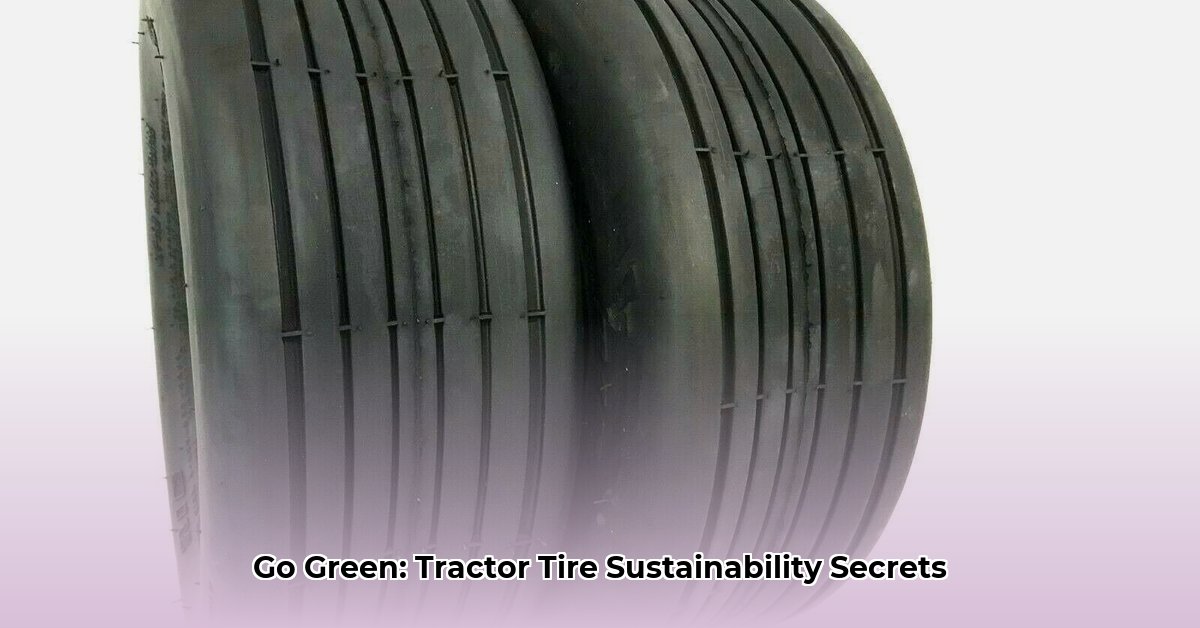
6.00-15 Tractor Tire: Sustainable Farming Practices
Your tractor tires are more than just rubber; they're a significant factor in your farm's efficiency and environmental impact. This guide focuses on extending the lifespan of your 6.00-15 tires and minimizing their environmental footprint. We'll cover tire maintenance, retreading options, and broader sustainable farming practices. For more information on tractor tires and rims, visit this helpful resource.
The Environmental Impact of Farm Tires
Manufacturing and disposing of tires consume considerable energy and resources, contributing significantly to your farm's carbon footprint. Fuel efficiency is directly linked to tire condition, influencing your overall environmental impact. Every stage of a tire’s life cycle—from production to disposal—holds environmental implications. Do you know how much your current tire practices cost your farm environmentally?
Extending 6.00-15 Tractor Tire Lifespan
Simple steps can dramatically extend tire life and reduce your environmental impact. Regular inspection and proper inflation are paramount.
- Weekly Inspections: Check for cuts, bulges, or uneven wear. Early detection prevents major damage.
- Accurate Inflation: Use a reliable gauge to inflate to the manufacturer's recommended pressure (printed on the sidewall). Underinflation drastically increases fuel consumption and wear.
- Tire Rotation: Rotate tires regularly to distribute wear evenly, maximizing lifespan and traction.
- Proper Storage: Protect tires from sun and elements during periods of inactivity.
Retreading: A Sustainable Alternative
Retreading offers a cost-effective and environmentally friendly alternative to replacing tires.
Pros: Lower cost, reduced waste, smaller carbon footprint.
Cons: Requires a reputable retreading service, and lifespan might be slightly shorter than new tires.
Beyond Tires: Sustainable Farming Practices
Sustainable tire management is part of a broader sustainable farming strategy:
- Fuel-Efficient Equipment: Well-maintained machinery reduces fuel consumption and emissions.
- Precision Farming: GPS-guided equipment minimizes overlap and fuel waste, reducing soil compaction.
- Advanced Tire Technology: Explore newer tires offering superior fuel efficiency and extended lifespan. These may have a higher initial cost, but the long-term savings can be substantial.
Choosing Sustainable Tires for Farm Machinery
Selecting the right tires significantly influences your farm's profitability and environmental footprint.
Understanding Tire Impact
Tires are the critical interface between your machinery and the soil. Poor tire choices lead to increased fuel consumption, soil compaction, and reduced yields.
Radial vs. Bias-Ply Tires
Radial tires offer lower rolling resistance, better traction, and longer lifespan compared to bias-ply tires. While bias-ply tires are cheaper upfront, the long-term fuel consumption and reduced lifespan negate the initial cost savings. "Radial tires are a demonstrably superior choice for both economic and environmental reasons," states Dr. Amelia Hernandez, Agricultural Engineer at the University of California, Davis.
Tire Size and Soil Compaction
Larger tires distribute weight, minimizing soil compaction. However, covering more ground means using sustainable practices like Controlled Traffic Farming (CTF) to mitigate environmental impacts.
Controlled Traffic Farming (CTF)
CTF utilizes designated wheel paths minimizing soil disruption. Higher tire pressure within the tracks and lower pressures outside enhances efficiency and environmental protection.
Advanced Tire Technologies: IF and VF Tires
Increased Flexion (IF) and Very High Flexion (VF) tires allow for higher loads at lower pressures, significantly reducing soil compaction. While more expensive upfront, the long-term gains in fuel efficiency and tire lifespan make them a sound investment.
Steps to Choosing Sustainable Tires
- Assess Needs: Evaluate current tire usage, soil type, and farming practices.
- Consider Radial Tires: Opt for radial tires if the budget allows; the long-term savings are significant.
- Explore IF/VF Tires: Investigate these advanced technologies for soil protection and efficiency.
- Implement CTF (if applicable): If using CTF, adjust tire pressure accordingly.
- Maintain Tires: Regular maintenance extends tire lifespan.
The Future of Sustainable Tires
Research focuses on developing more sustainable tire materials and improving recycling processes. The agricultural industry should move towards utilizing recycled rubber and plant-based materials for tire production, according to Dr. David Miller, Materials Scientist at Cornell University.
Conclusion: Sustainable Farming Starts With Your Tires
Adopting sustainable tire practices is a sound financial and environmental decision. Reducing fuel consumption, minimizing soil compaction, and extending tire lifespan create a more profitable and sustainable farm.